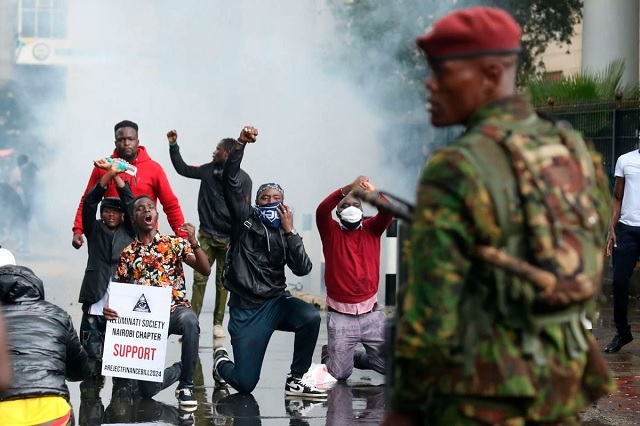
NAIROBI, Kenya | Xinhua | Normal business was disrupted in Nairobi, Kenya’s capital, and various towns across the East African nation Thursday as thousands of people protested against proposed taxation measures by the government.
The protests, the second this week, saw thousands of people dressed in black clothes pour onto the streets carrying their smartphones to record the events, placards with various messages, national flags and chanting songs. Most shops in Nairobi’s city center remained closed, and public transport was disrupted as the protesters flocked to the streets.
In some areas, the protesters clashed with police, who responded with tear gas and water cannons to disperse the crowds. In other parts of the central business district in Nairobi, officers armed with batons and tear gas watched from a distance.
“We reject the new taxes in totality. Life is already unbearable as it is; if they add new taxes, how shall we live?” posed Titus Kamau, a protester who criticized the government for imposing more taxes on citizens without considering their well-being.
“We are making our voices heard; we must speak for ourselves. These protests are about our future,” he said, noting that many in his generation, born between 1997 and 2009, were unemployed and found life increasingly difficult.
The protesters aim to prevent the passage of the Finance Bill 2024, which includes taxation measures to raise more revenue. President William Ruto announced Tuesday that his government had dropped some of the tax proposals after considering public feedback.
“We are going to end up with a product in Parliament that came from the Executive and has been interrogated by the Legislature. Through public participation, the people of Kenya have had a say,” Ruto said.
Among the dropped tax proposals were a 16 percent value-added tax (VAT) on bread, transportation of sugar, foreign exchange transactions, financial services, and a 2.5 percent Motor Vehicle Tax. The government also abandoned plans to impose new taxes on vegetable oil and a levy on various finished products contributing to electronic waste.
These concessions, however, failed to quell public anger, especially among the youth, who have turned to social media platforms to organize and fundraise for the protests. Kenya’s social media has been flooded with videos and photos from the protests as the youth leverage digital technology to amplify their efforts.
“We are not depending on political leaders this time to call for protests. These are our protests; it is us who want change,” shouted an angry protester.
While the Tuesday protests were confined to Nairobi, Thursday’s demonstrations spread to major towns across the country, including Kisumu and Kakamega in western Kenya, Eldoret and Kericho in the Rift Valley, and Mombasa and Kilifi at the coast.
“We are warning those legislators supporting these taxes. We will meet them at the ballot in 2027 and vote them out,” said Andrew, a protester in Kisumu, western Kenya.
On June 13, the government presented its 3.9 trillion shillings (about 30.3 billion U.S. dollars) budget for the financial year 2024/2025, aiming to accelerate economic growth. Cabinet Secretary for National Treasury and Economic Planning Njuguna Ndung’u said that the budget would maintain economic growth momentum as it recovers from persistent shocks affecting economic activities.
According to Ndung’u, the nation’s economy is projected to grow 5.5 percent in 2024, following growth rates of 5.6 percent in 2023 and 4.9 percent in 2022. The government aims to collect up to 22.5 billion dollars in ordinary revenue through the new taxation measures in the Finance Bill 2024.
As pressure mounts on the government from protesters, Kenya’s National Treasury warned Thursday that if the new tax proposals are shelved, the country risks a 1.55 billion dollar revenue shortfall in 2024/2025. ■
 The Independent Uganda: You get the Truth we Pay the Price
The Independent Uganda: You get the Truth we Pay the Price





